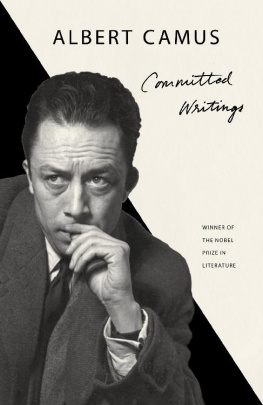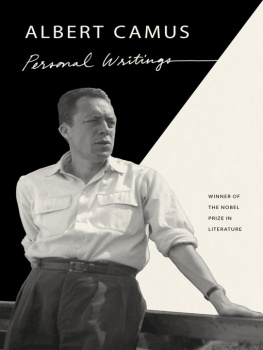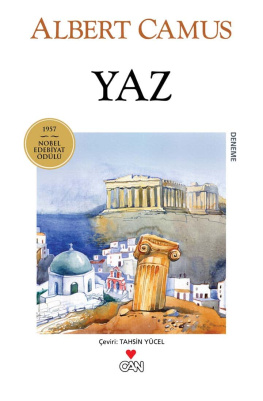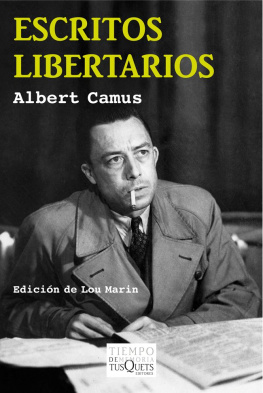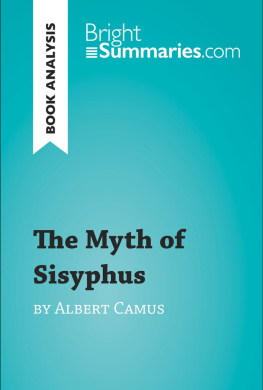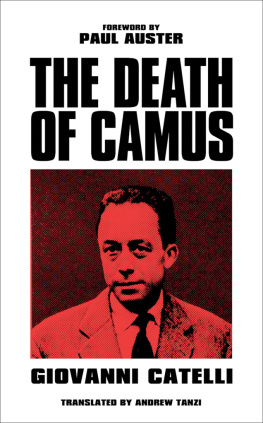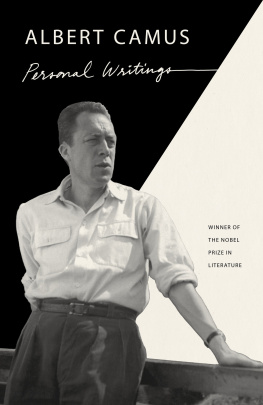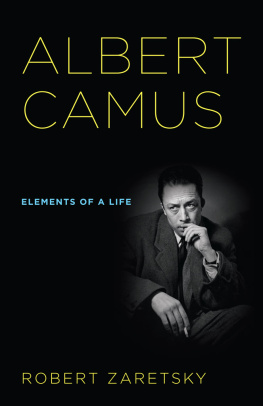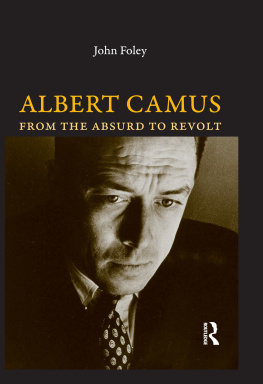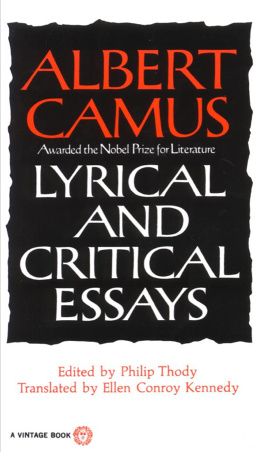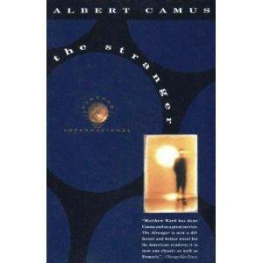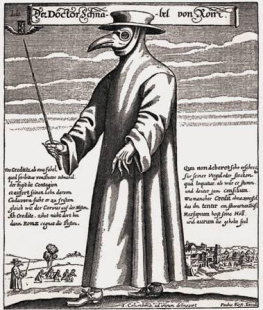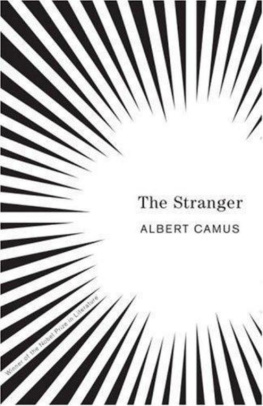Camus - Committed Writings
Here you can read online Camus - Committed Writings full text of the book (entire story) in english for free. Download pdf and epub, get meaning, cover and reviews about this ebook. year: 2020, publisher: Vintage, genre: Romance novel. Description of the work, (preface) as well as reviews are available. Best literature library LitArk.com created for fans of good reading and offers a wide selection of genres:
Romance novel
Science fiction
Adventure
Detective
Science
History
Home and family
Prose
Art
Politics
Computer
Non-fiction
Religion
Business
Children
Humor
Choose a favorite category and find really read worthwhile books. Enjoy immersion in the world of imagination, feel the emotions of the characters or learn something new for yourself, make an fascinating discovery.
- Book:Committed Writings
- Author:
- Publisher:Vintage
- Genre:
- Year:2020
- Rating:5 / 5
- Favourites:Add to favourites
- Your mark:
- 100
- 1
- 2
- 3
- 4
- 5
Committed Writings: summary, description and annotation
We offer to read an annotation, description, summary or preface (depends on what the author of the book "Committed Writings" wrote himself). If you haven't found the necessary information about the book — write in the comments, we will try to find it.
Committed Writings — read online for free the complete book (whole text) full work
Below is the text of the book, divided by pages. System saving the place of the last page read, allows you to conveniently read the book "Committed Writings" online for free, without having to search again every time where you left off. Put a bookmark, and you can go to the page where you finished reading at any time.
Font size:
Interval:
Bookmark:
Committed Writings
Albert Camus was born in Algeria in 1913. He spent the early years of his life in North Africa, where he became a journalist. During the Nazi occupation of France, his essential contributions to the underground newspaper Combat and the publication of The Stranger and The Myth of Sisyphus established him as a beacon of the Resistance in postwar intellectual life. His fiction, including The Stranger, The Plague, The Fall, and Exile and the Kingdom; his philosophical essays, The Myth of Sisyphus and The Rebel; and his plays have assured his preeminent position in modern letters. In 1957, Camus was awarded the Nobel Prize in Literature. On January 4, 1960, he was killed in a car accident.

The Stranger
The Myth of Sisyphus
Caligula and Three Other Plays
The Plague
The Rebel
The Fall
Exile and the Kingdom
The First Man
Create Dangerously
Personal Writings


Copyright 1960 by Alfred A. Knopf, Inc.
Copyright renewed 1988 by Alfred A. Knopf, Inc.
Create Dangerously translation copyright 2019 by Sandra Smith
Foreword copyright 2020 by Alice Kaplan
All rights reserved. Published in the United States by Vintage Books, a division of Penguin Random House LLC, New York, and distributed in Canada by Penguin Random House Canada Limited, Toronto. Originally published in the United States by Alfred A. Knopf, a division of Penguin Random House LLC, New York, in 1960.
The essays, originally published in French, were selected from Lettres un ami allemand, copyright 1948 by Editions Gallimard, and Rflexions sur la peine capitale, copyright 1957 by Calmann-Lvy; the Nobel Prize acceptance speech (December 10, 1957) and Create Dangerously, Camuss December 14, 1957, speech at Uppsala University in Sweden, were originally published in French as Discours de Sude, copyright 1958 by Editions Gallimard, Paris. Create Dangerously was first published in English in Resistance, Rebellion and Death, copyright 1961 by Alfred A. Knopf, a division of Penguin Random House LLC, New York. Translated by Justin OBrien. The Nobel Prize acceptance speech was published in English by Alfred A. Knopf, a division of Penguin Random House LLC, New York. Copyright 1958. Translated by Justin OBrien.
Vintage and colophon are registered trademarks of Penguin Random House LLC.
Library of Congress Cataloging-in-Publication Data
Names: Camus, Albert, 19131960, author. | OBrien, Justin, 19061968, translator. | Smith, Sandra, 1949 translator. | Kaplan, Alice Yaeger, writer of foreword.
Title: Committed writings / Albert Camus ; translated from the French by Justin OBrien and Sandra Smith ; with a foreword by Alice Kaplan.
Description: A Vintage International original, August, 2020. | New York : Vintage International, Vintage Books, a Division of Random House LLC, 2020.
Identifiers: LCCN 2020009963 (print) | LCCN 2020009964 (ebook) | ISBN 9780525567196 (trade paperback) | ISBN 9780525567202 (ebook)
Subjects: LCSH: EuropePolitics and government.
Classification: LCC PQ2605.A3734 A2 2020 (print) | LCC PQ2605.A3734 (ebook) | DDC 844/.914dc23
LC record available at https://lccn.loc.gov/2020009963
Vintage International Trade Paperback ISBN: 978-0-525-56719-6
eBook ISBN: 978-0-525-56720-2
www.vintagebooks.com
Foreword by Alice Kaplan
Letters to a German Friend
Reflections on the Guillotine
The Nobel Speeches
Nobel Prize Acceptance Speech
Create Dangerously
Alice Kaplan
Camus is unsurpassed among twentieth-century French writers for a body of work that animates the wonder and absurdity of existence. Letters to a German Friend, Reflections on the Guillotine, and the Nobel speeches sit alongside his classic novels and essays The Stranger, The Myth of Sisyphus, and The Plague as the clearest expression of his moral intuitions. For Albert Camus, commitment was always a form of vigilancea refusal of complacency, of coercive abstractions and murderous ideologies. He searched for truth and freedom through the complete embodiment of empathy, his solidarity with others. Producing a play, putting out a newspaper: these group endeavors were central to his lifes work and provided a foundation for the kind of political and moral optimism that saw its fullest expression in The Plague, in the calm persistence of the public-health squads. He was also aware of the limits of commitment. During his lifetime, there was no shortage of political parties pursuing violent doctrines and governments driven by corrupt motives. Commitment, he knew, could be a blinding devotion as well as a force for good.
The essays and speeches gathered here represent three faces of Camuss commitment. Letters to a German Friend, born of his experience in the Resistance, is a passionate confrontation with Nazi ideology. Here Camus explores his willingness to take up arms against tyranny, reimagines love of country, and calls for a new Europe. His is one of the earliest arguments for a postwar European Union, a half century before European citizenship became a reality. Reflections on the Guillotine, written in 1957, one of the deadliest years of the Algerian War, became the signal text for the French abolition of the death penalty in 1981. The Swedish speeches explore a specific form of commitmentthe commitment to createthanks to which Camus remains one of the strongest models available today for artists in search of justice. These essays can be read together, as a manual of commitment, or separately, for their affinities with his other writings: Letters to a German Friend, a monologue with an imagined interlocutor, is a precursor to Camuss novel The Fall; Reflections on the Guillotine takes up the scandal of capital punishment central to The Stranger; the theme of dangerous creation in the Nobel speeches appears in The Human Crisis, the lecture Camus delivered in the United States in 1946, and in a lesser-known essay, The Artist in Prison. This 1952 essay explores the transformation of Oscar Wildea dandy, committed only to being superficial, until the devastating experience of an unjust incarceration redefined his vision.
When Camus was barely twenty-five years old, having recently graduated with a masters degree in philosophy, his former professor and mentor cynically told him that joining the Algerian Communist Party, or PCA, was a vexed matter but an indispensable part of growing uphe might as well do it because there was no way around it. During his two years in the party, from 1935 to 1937, he came into his own as an intellectual. He founded and directed a cultural center and a theater troupe, Le Thtre du Travail (The Theater of Work), while he prepared a first volume of personal essays, The Wrong Side and the Right Side. Though it would be thirty more years before Algeria won its independence from France, anti-colonialist activity was already stirring. Camus was assigned to recruit Muslims to the cause. However, by 1937, Hitler was on the move, and the party switched its orientation away from colonialism and toward the coming war. The party remained silent as anti-colonial activists were arrested and prosecuted by the colonial government. Camus grew disillusioned with the party, and the party, in turn, expelled him.
Font size:
Interval:
Bookmark:
Similar books «Committed Writings»
Look at similar books to Committed Writings. We have selected literature similar in name and meaning in the hope of providing readers with more options to find new, interesting, not yet read works.
Discussion, reviews of the book Committed Writings and just readers' own opinions. Leave your comments, write what you think about the work, its meaning or the main characters. Specify what exactly you liked and what you didn't like, and why you think so.

